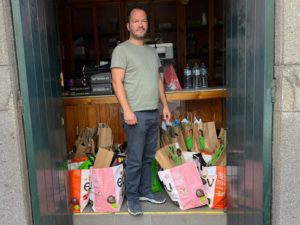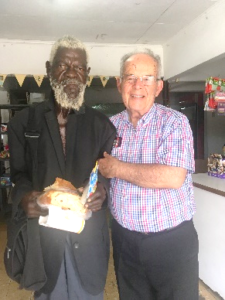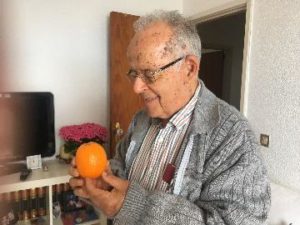PEOPLE HELPING PEOPLE (PHP)
Hello friends,
I’m sure many of you know that if you asked Fr. Bernardino what is “People Helping People”, he would first tell you it is a way of life, and then he would tell you it is also a Charity…
His idea for this kind of Charity started in the US, when a lady that lived in a small home called him, and asked if he knew of anyone that had an old dryer she could have as hers was broken, and she
couldn’t afford to fix it. He said he didn’t, but he would keep her in mind in case something came up.
A few hours later, a man called saying he had an old, but still working dryer to offer in case he knew someone who needed it!
Of course, my Uncle was radiant with this coincidence! You all know how precious these “little miracles” were to him.So in few weeks, he cleared a big space in the parish, and made known that everything that people didn’t need, they could leave it there, and if anyone needed anything, they could simply come by and take what they needed, no questions asked. Of course, it evolved into something bigger than that, and eventually they were even distributing meals. And that is precisely what he felt was happening, it was simply People Helping People as a way of life.
So that was what he decided to do here in Madeira after those terrible floods in 2010, and the attention he had for our most fragile brothers and sisters.
Of course, we never had a big space we could use as warehouse as he did in the US. We don’t even have a small space of our own! All we have is lent or offered.
His Charity is simply the intermediary between People who want to Help other People. That is why his favourite reference was the Good Shepherd Jesus, the One who taught us to care for each other, the One who reminds us that no one stays behind, the One who told us that whatever you do for your weaker brothers and sisters, you do it for Him.
We have all been mourning Fr. Bernardino for the last few weeks. It’s been strange carrying on in his absence. But of course, the Charity he founded has continued its work. Many of you certainly heard about how he was afraid that “People Helping People” would end with his death. I promised him that I would not allow that to happen. Two weeks ago, I held a meeting with some volunteers, who are all dedicated to making sure it keeps on running, growing and flourishing into the Charity that Fr. Bernardino dreamt of. And so, it is my privilege and honour to announce that our charity’s name will be changed to “Gente Ajudando Gente – Associação Pe. Bernardino de Solidariedade Social” meaning “People Helping People – Fr. Bernardino Social Solidarity Association”.
I know he would plead to keep the “People Helping People” part. As for him, it was a way of life. It’s simply what we should do when someone needs help. He would certainly be very embarrassed to see his name on it, but since he can’t deny us, we’re going for it. It just feels right. He is not only its founder, he is also the mentor at the heart of everything we do, and the way we do it in the Charity. It is truly his Association. I know it is a big name, maybe even a bit clumsy, but there are things we can’t take out legally (Social Solidarity Association), there are things we didn’t want to take out (People Helping People), and something I feel strongly everyone agrees to add, is Father Bernardino’s name.
I like it, and I hope you like it too. See you soon, and thank you all for being People Helping People.



